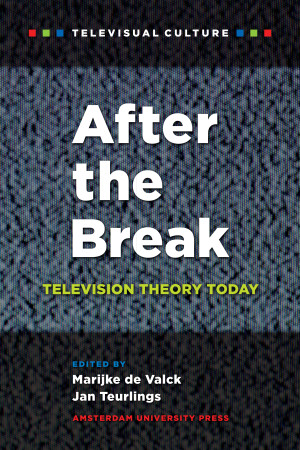After the Break - 2
TELEVISUAL CULTURE - 3
Table of Contents - 6
After the Break, Television Theory Today - 8
1. Questioning the crisis - 12
2. New paradigms - 14
3. New concepts - 15
4. Concluding thoughts - 16
References - 16
Part I: Questioning the crisis - 20
'Unreading' contemporary television - 22
1. Analyzing quality television=and why it is redundant - 24
2. The complexities of television as medium - 26
3. Unreading television - 28
4. Conclusion - 31
References - 32
Caught, Critical versus everyday perspectives on television - 36
1. Media 2.0 and the cultural studies perspective on television - 38
2. The mass communication paradigm in its protoprofessionalized version - 40
3. Conclusion - 47
Notes - 48
References - 49
The persistence of national TV, Language and cultural proximity in Flemish fiction - 52
1. National television in a global era - 52
2. National viewing - 55
3. The Flemish case - 57
4. Conclusion - 61
Notes - 62
References - 62
Constructing television, Thirty years that froze an otherwise dynamic medium - 66
1. An era of constraint - 68
2. The public and the nation: lessons from the Third Reich - 70
3. A television freeze and a Cold War - 72
4. Contextualizing constraint - 74
Notes - 78
References - 78
When old media never stopped being new, Television's history as an ongoing experiment - 80
1. Always already new: the ongoing transformation of television - 81
2. Experimental systems - 83
3. Experiments in television - 85
4. Experimental moments of broadcast/network television - 88
5. Broadcast/network television as an ongoing experiment - 91
6. Post-network experiments - 92
7. Closing remark on television studies - 94
Notes - 95
References - 96
Part II: New paradigms - 100
Unblackboxing production, What media studies can learn from actor-network theory - 102
1. ANT - a very short introduction - 103
2. A mechanics of power - 105
3. Media from an ANT perspective - 106
4. The media's mechanics of power - 108
5. A teaching moment - 110
6. Conclusion - 113
Notes - 114
References - 114
Convergence thinking, information theory and labour in 'end of television' studies - 118
1. Introduction - 118
2. The empirical tendency and information theory - 120
3. Convergence thinking - 124
4. Conclusion - 127
Notes - 129
References - 129
Television memory after the end of television history? - 132
1. Television memory and television history - 133
2. Television memory and audience research - 134
3. The complexity of the concept of television memory - 136
4. Representations of the past on television: television as memory maker - 137
5. Towards a new participative television memory - 140
6. Conclusion - 142
Notes - 143
References - 143
Part III: New concepts - 146
YouTube beyond technology and cultural form - 148
1. Introduction - 148
2. YouTube as technology: homecasting - 149
3. YouTube as social practice: video-sharing - 151
4. YouTube as cultural form: snippets - 154
5. Conclusion - 157
Notes - 158
References - 159
Move along folks, just move along, there's nothing to see, Transience, televisuality and the paradox of anamorphosis - 162
Notes - 175
References - 175
Barry Chappell's Fine Art Showcase. Apparitional TV, aesthetic value, and the art market - 180
1. The value of art on TV - 180
2. The art of selling the work of art - 183
3. Apparitional television - 185
4. Conclusion - 190
Notes - 191
References - 191
About the authors - 194
Index - 198

